Ever found yourself hesitating to ask a guest to remove their shoes, only to be told by someone, like your mother-in-law, that you’re being discourteous? You’re not alone! It’s a surprisingly polarizing topic that touches on cleanliness, cultural customs, and hosting etiquette. So, is it really rude to request this, or is it simply a matter of personal preference?
Understanding the Cultural Context of Shoe Removal

One of the biggest factors shaping opinions on this issue is culture. In many Asian and Scandinavian households, removing shoes is not just polite—it’s a must. It’s seen as a sign of respect and a way to keep homes clean and sacred. On the other hand, many Western cultures don’t place as much emphasis on this practice. Guests often keep their shoes on indoors, and requesting otherwise might be considered unusual.
Does this mean you shouldn’t ask guests to remove their shoes if it’s part of your household tradition? Absolutely not! The key is recognizing that cultural norms differ. Being aware of these differences can help you approach the topic in a way that’s both respectful and confident.
Health and Hygiene: The Case for Bare Floors
If you’ve ever looked at the bottom of a pair of shoes after a long day, you already know they’re not exactly clean. Shoes can track in dirt, bacteria, and allergens that could easily spread around your home. For families with small kids crawling on the floor or those with allergies, maintaining a shoe-free home can be a lifesaver.
Think about it: would you want the same shoes that trudged through public bathrooms or muddy sidewalks to stomp across your living room carpet? Probably not. Explaining this perspective to your guests can make your request feel less like an arbitrary rule and more like a thoughtful choice for the health of everyone in the household.
Does Hosting Etiquette Really Say No to Shoe Removal?
Traditional hosting etiquette often emphasizes guest comfort, suggesting that making guests feel at home should be your top priority. But modern etiquette acknowledges that it’s equally important to respect the host’s rules. After all, it’s your home, and you’re entitled to set boundaries.
The trick is finding a balance. Yes, you want your guests to feel comfortable, but you also want to feel comfortable in your own space. Asking guests to remove their shoes doesn’t have to be a big deal—it’s all about how you frame the request. Approach it with kindness, and most guests will happily comply.
Managing Family Dynamics: When Your Mother-in-Law Disagrees
Let’s face it: family dynamics can complicate even the simplest decisions. If your mother-in-law insists that asking guests to remove their shoes is “rude,” it can feel like you’re caught in the middle. So, how do you handle this without creating tension?
Start by having a calm conversation. Explain why this practice matters to you—whether it’s about cleanliness, cultural tradition, or personal preference. Acknowledge her perspective, but make it clear that this is a decision you’ve made for your home. Compromise can help here; for example, you could consider allowing exceptions for certain guests or occasions while sticking to your rule in everyday situations.
How to Politely Ask Guests to Remove Their Shoes
So, how do you actually ask someone to take their shoes off without sounding rude or awkward? It’s all about tone and preparation. Here are a few tips:
- Set the Tone Beforehand: If possible, let guests know about your shoe-free policy before they arrive. A simple mention in an invitation—like, “Feel free to bring comfy socks; we’re a shoe-free household!”—can go a long way.
- Provide Comfort: Make the transition easier by offering a designated shoe rack by the door and providing clean slippers or cozy socks for guests who might feel uncomfortable going barefoot.
- Use Polite Language: When guests arrive, frame the request as a preference rather than a demand. For example, “We usually ask everyone to leave their shoes at the door to keep things clean. Thanks so much!”
When you approach the topic with thoughtfulness, most people will appreciate your effort and won’t think twice about slipping off their shoes.
Balancing Tradition and Modern Practices
Incorporating traditions while respecting modern hosting practices can be a delicate dance. Traditional etiquette might emphasize catering to guests’ every need, but modern hosting often focuses on mutual respect and consideration. Striking the right balance means blending these approaches.
For instance, if you’re hosting a formal dinner party and you know some guests might find shoe removal awkward, consider making an exception for that event. But during casual gatherings or day-to-day visits, stick to your shoe-free rule. Flexibility shows thoughtfulness while still honoring your personal boundaries.
When Compromise Isn’t an Option
What if you have guests who outright refuse to take their shoes off, or your mother-in-law insists on overriding your rule? In these cases, it’s essential to stand your ground politely but firmly. Your home is your sanctuary, and maintaining its cleanliness and comfort is your right.

If someone disagrees, remind them that this isn’t about being “rude” or “discourteous.” It’s about creating an environment that works for your household. Offering alternatives—like slippers for those who prefer not to go barefoot—can help smooth over any discomfort.
Conclusion: Creating a Home That Reflects Your Values
Ultimately, asking guests to remove their shoes isn’t rude—it’s a reflection of your values and preferences. Whether you’re motivated by cleanliness, cultural tradition, or personal comfort, it’s entirely reasonable to expect guests to respect your house rules. The key is clear, kind communication and a willingness to accommodate others’ needs whenever possible.
At the end of the day, successful hosting isn’t about rigid adherence to etiquette or sacrificing your boundaries. It’s about creating an environment where both you and your guests feel respected and at ease. So, go ahead—ask politely, offer slippers, and enjoy a clean, happy home that truly feels like your own.
My Foster Dad Gave Me One Dollar on My 5th Birthday — Years Later It Radically Changed My Life When I Was at My Lowest

Clichés about small things having big impacts usually roll off your ears, right? But for me, a single birthday gift, a dollar bill no less, became the unlikely lifeline that transformed my life as a homeless kid. This is the story of how that crumpled dollar bill not only carried me through the toughest times but also steered me on a path to success I never dared to dream of.

A white couple with their black foster son | Source: Midjourney
I was two years old when Steve and Linda, my foster parents, took me in. They were a white couple with big hearts and already had eight Black foster kids like me. They treated us all like their own children.
I didn’t even know what my biological parents looked like, and honestly, I didn’t care much because Steve and Linda were everything I could ever hope for in my parents.
Being the youngest, I was always shy and thought everyone else was better than me. But Steve, my foster dad, had a way of making me feel special.

A white father laughing with his black foster son | Source: Midjourney
I remember how he’d kneel down, look me straight in the eyes, and say, “Dylan, you’re just as good as anyone else. You’ve got a spark in you, kid.”
My fifth birthday was a turning point in my life, though not in the way most birthdays are. That was the day my biological parents showed up out of nowhere. They wanted me back, and for reasons I couldn’t understand, the authorities decided I should go with them.
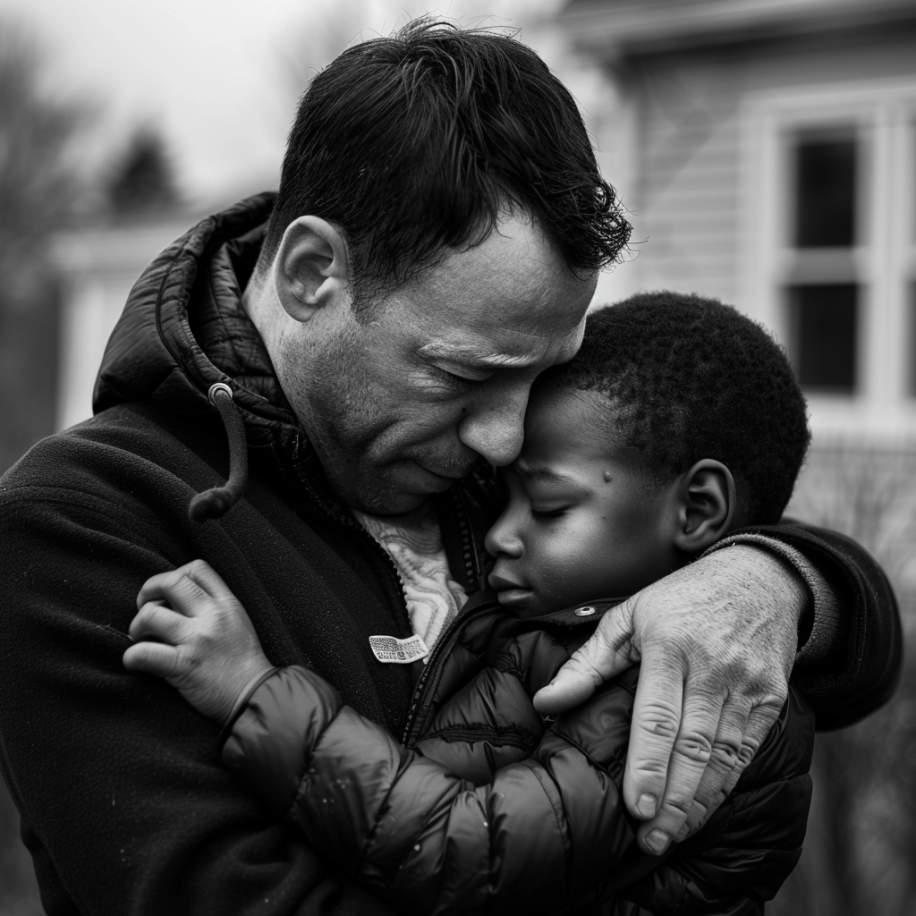
A grayscale photo of a white father comforting his sad black son | Source: Midjourney
I remember the day I had to leave like it was yesterday. I was crying my heart out as I hugged Steve one last time. “Dad, I’ll never be anything,” I sobbed. “I’m just a loser.”
Steve hugged me tighter and whispered, “Happy birthday, Dylan. Here’s something for you.” He handed me a one-dollar bill and added, “There’s a special message for you written on this bill. Never lose it.”
At the time, I couldn’t read or write, so I didn’t pay much attention to those words. I just shoved the bill into my pocket and held onto Steve, not wanting to let go.

A one-dollar bill lying on a table | Source: Midjourney
Leaving my foster family was the hardest thing I had ever done. My biological parents took me to Europe, where we lived together. But it didn’t take long for their true colors to show. They weren’t doing well financially or emotionally, and two years later, they abandoned me in a park.
I was seven years old then, alone, and scared. I remember sitting on a park bench, clutching the dollar bill Steve had given me. It was the only piece of my past that I had left.
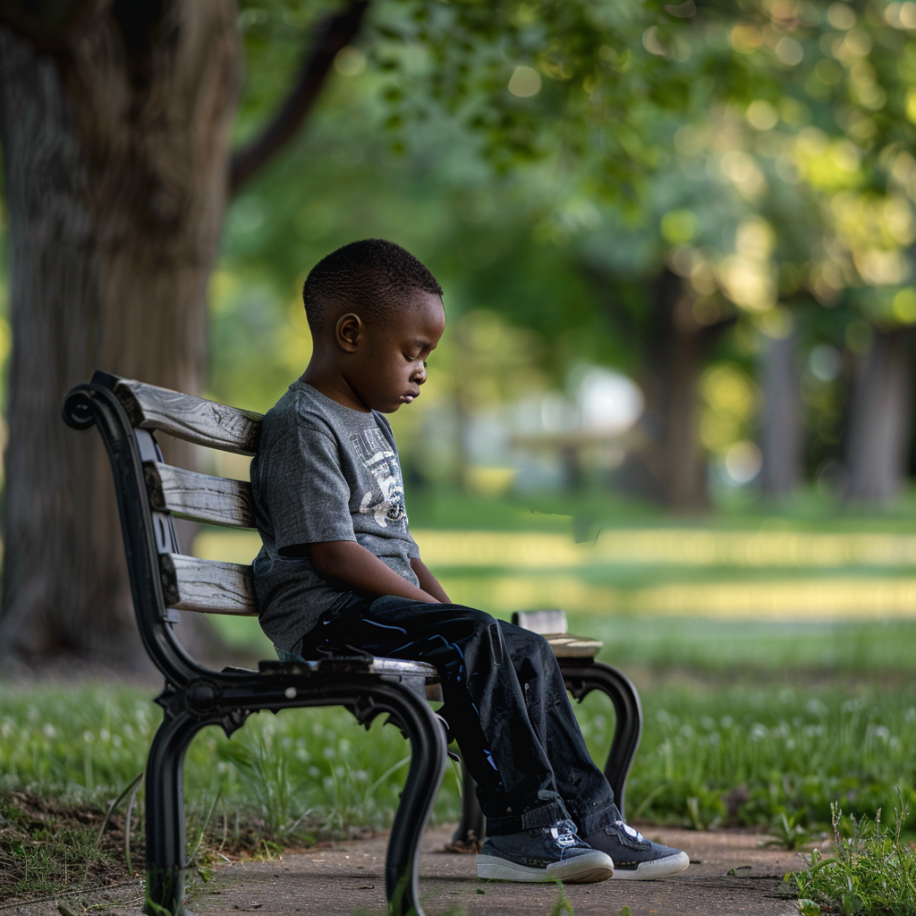
A black boy sitting alone on a bench in a park | Source: Midjourney
That day, I made a promise to myself. “No more orphanages and no more foster families, Dylan. You’re going to make it on your own.”
And so, for the next nine years, I lived on the streets, begging for money and doing odd jobs just to get by. Life was tough, and many nights I went to bed hungry. I learned to be resourceful and always kept that dollar bill close to me. It was a reminder of better times and the love I once knew.
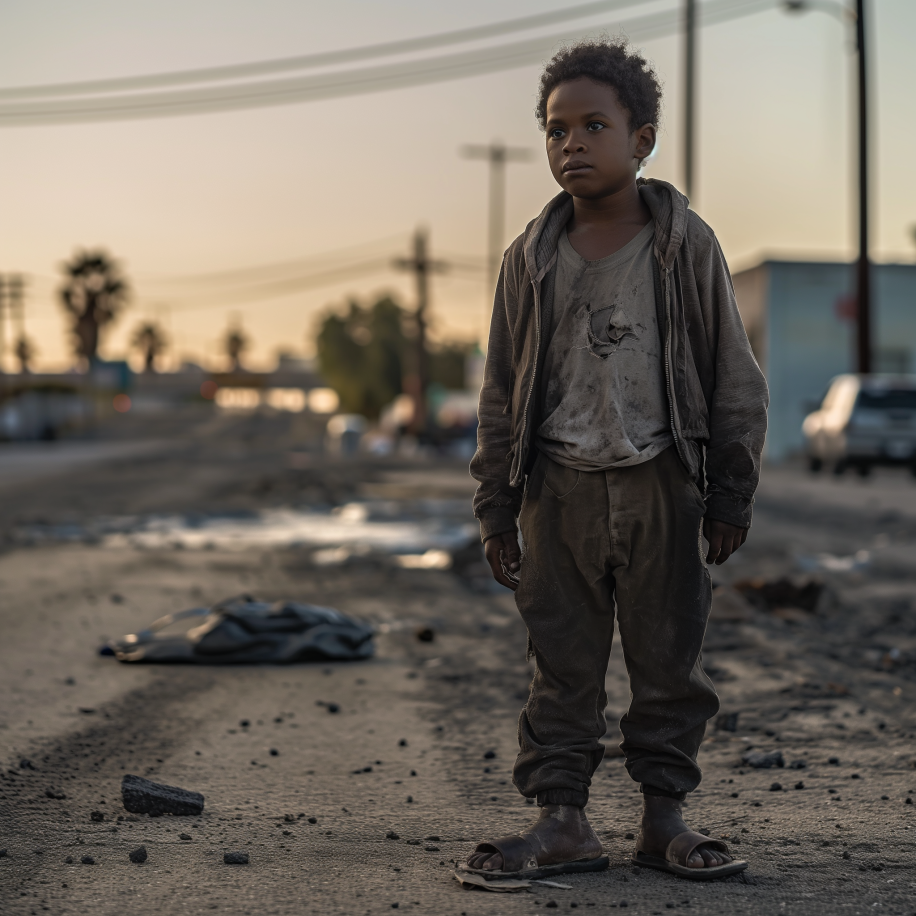
A homeless black boy on the streets | Source: Midjourney
One day, I met a homeless man named Jacob. He was older, with a kind face and a worn-out look. We struck up a friendship, and he took me under his wing.
“Hey, kid,” Jacob said one evening as we sat under a streetlight. “Got something for you.” He pulled out an old, tattered book he had found in the trash. “We’re gonna learn to read and write.”
Every evening, we’d sit together with that book. Jacob would patiently point at the words and say, “Dylan, you’ve got to learn this. It’s your way out of here.”
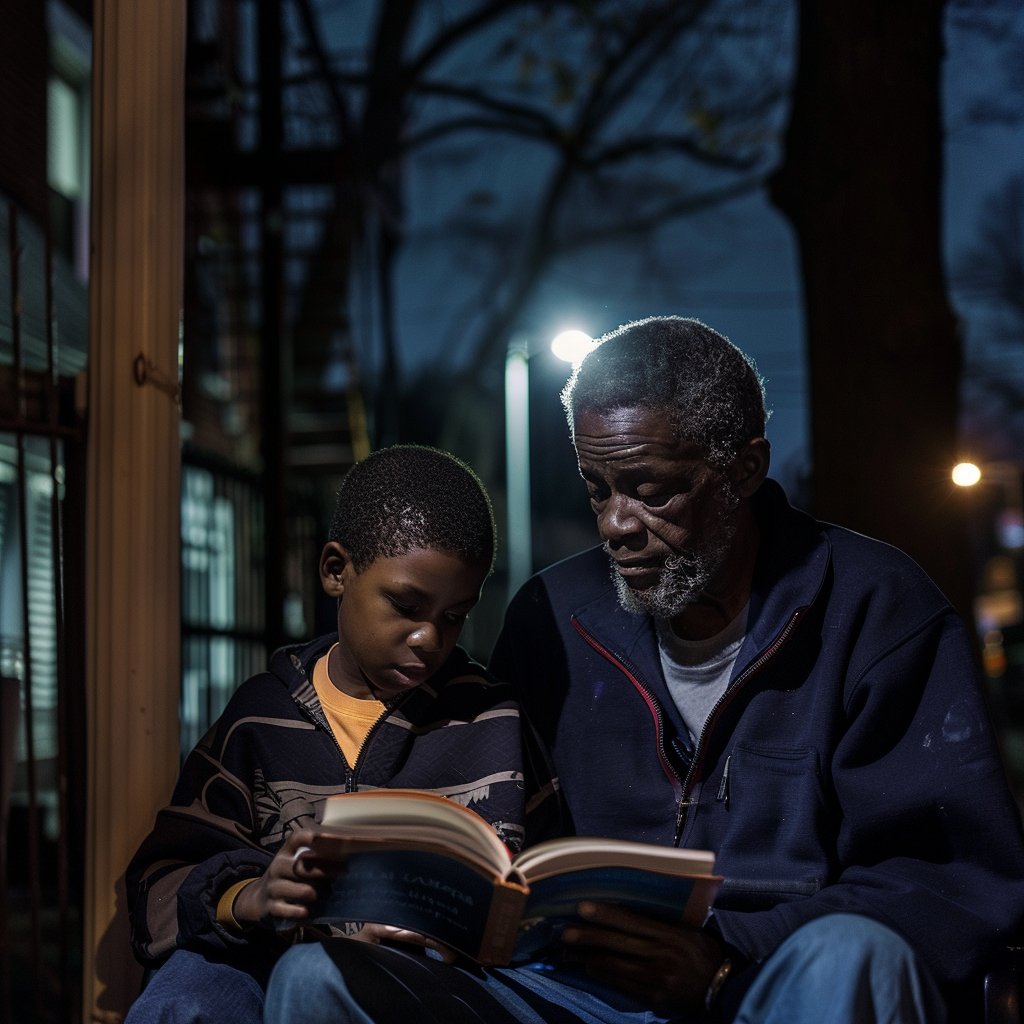
A black man on the street teaches a homeless black boy to read a book | Source: Midjourney
I soaked up everything he taught me, and slowly, I started to read and write. It felt like a small spark of hope in an otherwise bleak existence. I never told Jacob about the dollar bill or the message written on it.
It was my little secret, a connection to my past that I wasn’t ready to share. Life on the streets was tough, but Jacob and I managed to find small joys in the little things. We shared stories about our pasts, laughed about the absurdity of life, and dreamed about a better future.
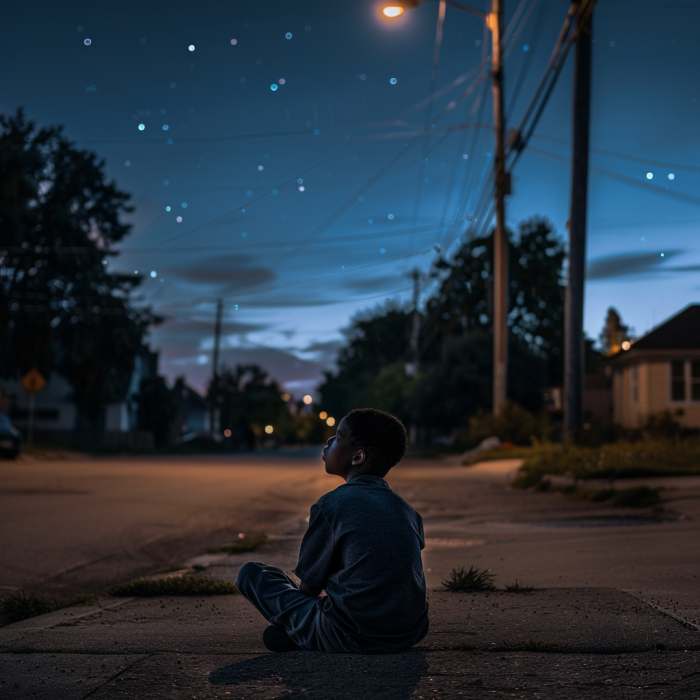
A homeless black boy looks at the starry sky at night | Source: Midjourney
“Jacob, do you think we’ll ever get out of here?” I asked one night, staring up at the stars.
Jacob smiled softly, his eyes filled with a mix of hope and reality. “Maybe, Dylan. But no matter what, we have to keep believing we can. That’s what keeps us going.”
Over time, Jacob became the closest thing to family I had, and his friendship kept me going through the darkest times. His belief in me was unwavering, and it was that belief that fueled my determination to survive and succeed.
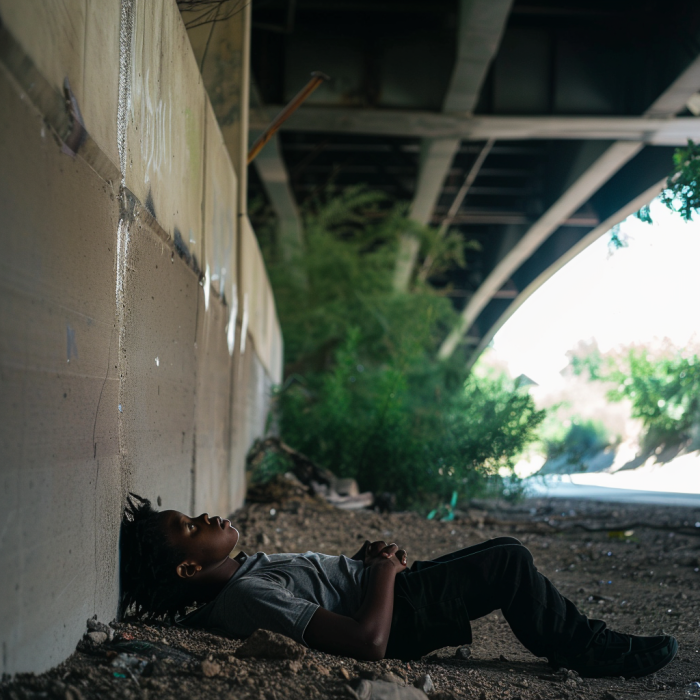
A homeless black boy lying underneath a bridge | Source: Midjourney
One day, while lying under a bridge, I accidentally pulled out that same dollar bill my foster dad Steve had given me years ago. It was crumpled and faded, but the memory of Steve’s comforting words came rushing back.
I remembered there was supposed to be a message for me on it. So, with trembling hands, I unfolded it. Here’s what it said: “You are my son and always will be, no matter what. I always believed in you and always will. This dollar is lucky. With it, you will succeed, but you have to believe in yourself!”

A closeup shot of a black teenager holding an old and crumpled one-dollar bill | Source: Midjourney
Those words hit me hard. They reignited a spark inside me that had long been smothered by years of hardship. I read the message over and over, letting Steve’s belief in me sink in. Little did I know that this very message would radically change my life.
From that day on, I was determined to turn my life around. I started working harder than ever, taking on any job I could find. Mornings were spent cleaning up at a local diner.
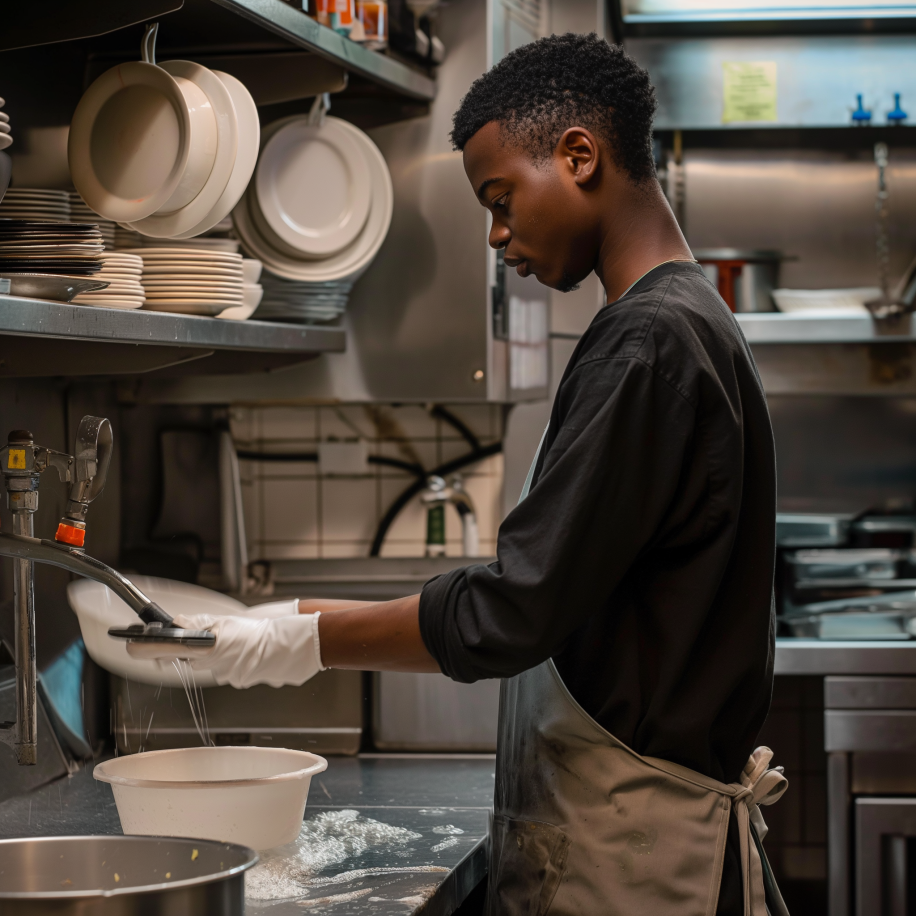
A teenage black boy is washing dishes in a restaurant | Source: Midjourney
In the afternoons, I helped an old man named Mr. Johnson with his garden, and in the evenings, I worked as a dishwasher at a small restaurant. I barely had time to rest, but I didn’t care. I was on a mission.
One day, while I was scrubbing dishes in the back of the restaurant, an elderly man walked in. He had a distinguished air about him, and everyone seemed to know and respect him. He watched me work for a while, then approached me. “You’re quite the hard worker, aren’t you?” he said, his eyes twinkling with curiosity.
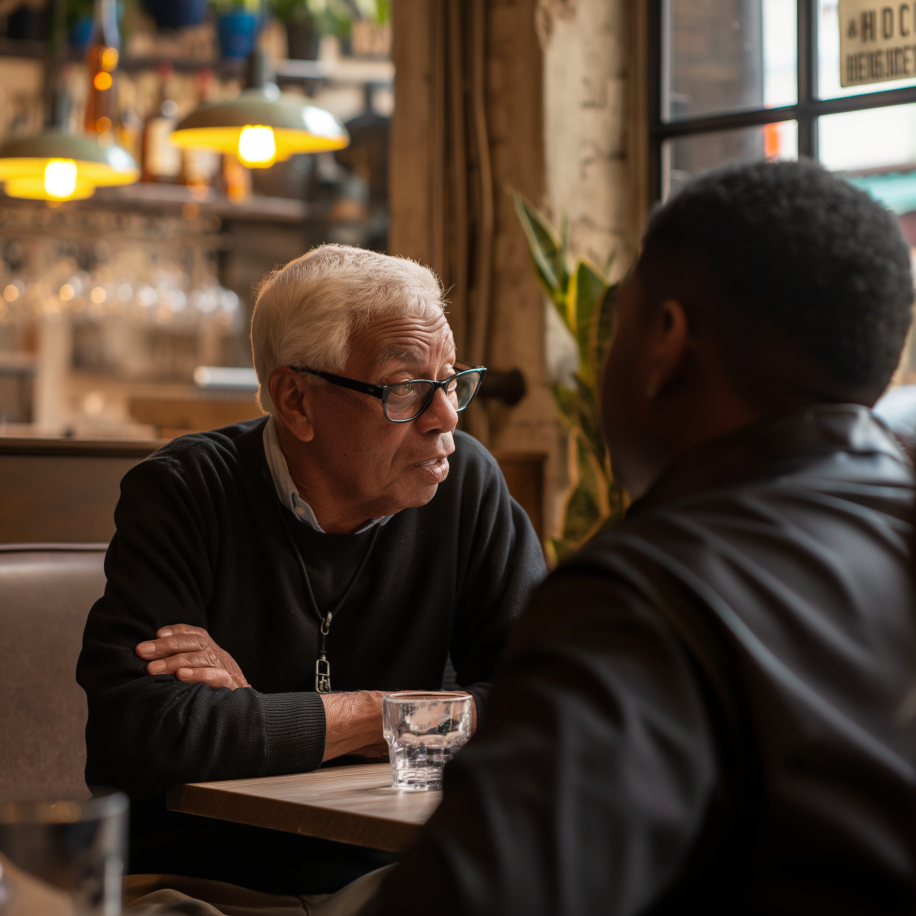
An elderly man talks to a black guy in a restaurant | Source: Midjourney
I wiped my hands on my apron and nodded. “I have to be. I don’t have much of a choice.”
He smiled. “What’s your name, son?”
“Dylan, sir.”
“Well, Dylan, I’m Mr. Brown. I’ve been watching you for a few days now, and I’m impressed by your dedication. How would you like to work for me?”
I was stunned. “Work for you? Doing what?”
“I need a driver. Someone reliable and hardworking. You fit the bill. I’ll help you get the necessary documents, a passport, and anything else you need.”

A black man driving a car | Source: Midjourney
I couldn’t believe my ears. “Why me?”
Mr. Brown chuckled. “Because you remind me of myself when I was your age. Determined, hardworking, and willing to do whatever it takes. So, what do you say?”
I didn’t hesitate. “Yes, sir. I’d be honored.”
Working for Mr. Brown was the break I needed. He taught me everything he knew about business, and over the years, he became like a mentor to me. He showed me the ropes, and I soaked up every bit of knowledge he shared.

A black man flying in an airplane | Source: Midjourney
After a few years, he trusted me enough to appoint me as the manager of his company’s branch in the USA.
When I flew to the USA, the first thing I did was visit my foster parents’ house. They were older now, and when I knocked on the door, it took a moment for them to recognize me. But once I explained who I was, they hugged me in tears.
Steve, my foster dad, looked at me with pride in his eyes. “Dylan, is it really you?”
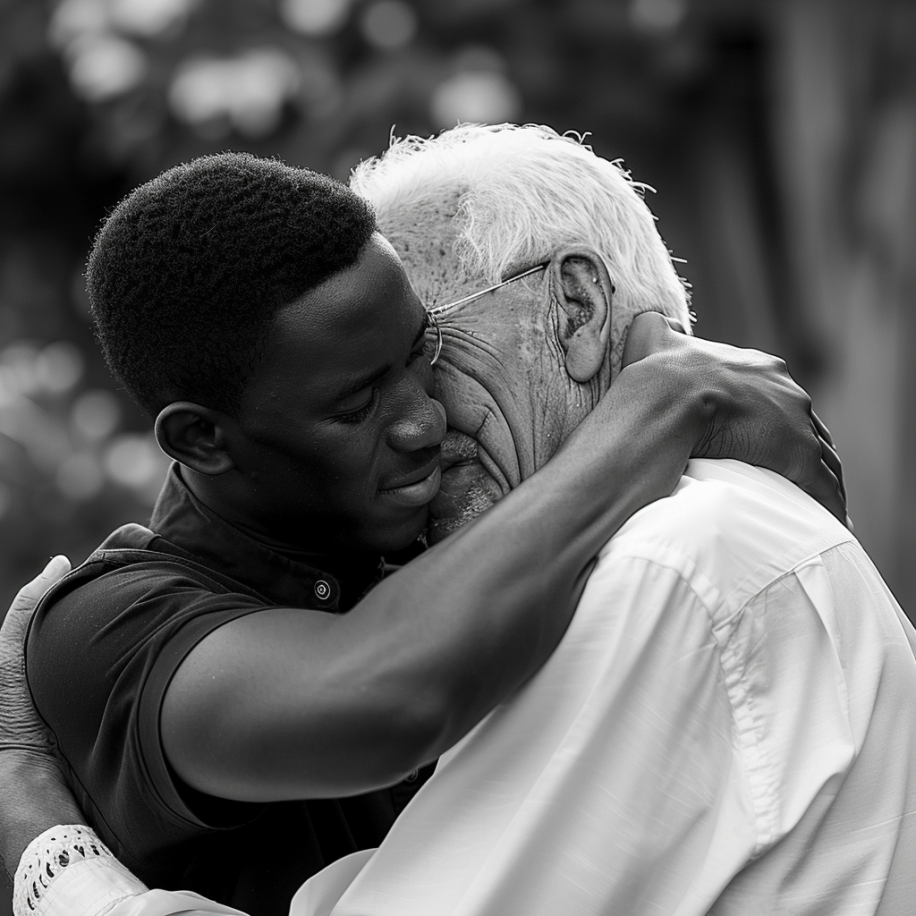
A black man hugging his white foster dad | Source: Midjourney
I nodded, tears streaming down my face. “It’s me, Dad. I made it.”
I pulled out that same dollar bill, which I had kept safe all these years, and handed it to him. “It really works! This dollar is lucky!”
Steve smiled, a tear rolling down his cheek. “When you didn’t know it was lucky, you were homeless. As soon as you knew it was lucky, you succeeded. Maybe it’s not the dollar but you?”
I laughed through my tears and hugged him tight. “Maybe you’re right, Dad.”
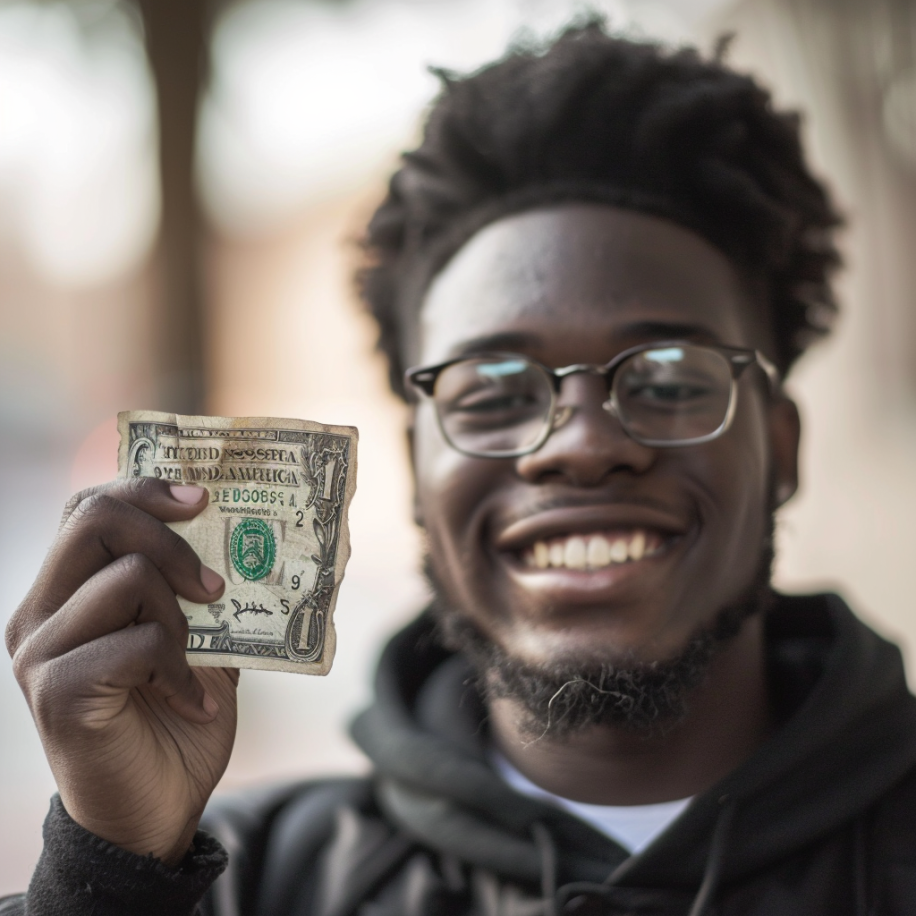
A black man smiling while holding a crumpled one-dollar bill | Source: Midjourney
He chuckled. “Besides, I pulled it out of my wallet just five minutes before I handed it to you all those years ago. I was deciding between a five-dollar bill and a one-dollar bill. I chose the one-dollar!”
We both laughed, holding each other close. It felt like coming home after a long, hard journey. I realized then that the true luck wasn’t in the dollar bill but in the love and belief Steve had always had in me.

A white elderly man is laughing with his black son at home | Source: Midjourney
Reuniting with my foster family felt like a full-circle moment. Despite all the hardships, I made it through, thanks to the love and support of my foster parents and the lessons learned from friends like Jacob.
Life had thrown many challenges my way, but with resilience, hard work, and a bit of luck, I had overcome them. And through it all, I learned that the most important thing was to believe in yourself, just as Steve had believed in me.

A happy black man standing in his office | Source: Midjourney
Want to explore more heartwarming stories? Click here to read another one: Imagine losing your everything, then defying the world to honor their memory. That’s where this story starts. My son, a dream tragically shattered, and a trip to Europe that took an unexpected turn: one that revealed the true depths of grief and love. Let me tell you about it.
This work is inspired by real events and people, but it has been fictionalized for creative purposes. Names, characters, and details have been changed to protect privacy and enhance the narrative. Any resemblance to actual persons, living or dead, or actual events is purely coincidental and not intended by the author.
The author and publisher make no claims to the accuracy of events or the portrayal of characters and are not liable for any misinterpretation. This story is provided “as is,” and any opinions expressed are those of the characters and do not reflect the views of the author or publisher.



Leave a Reply